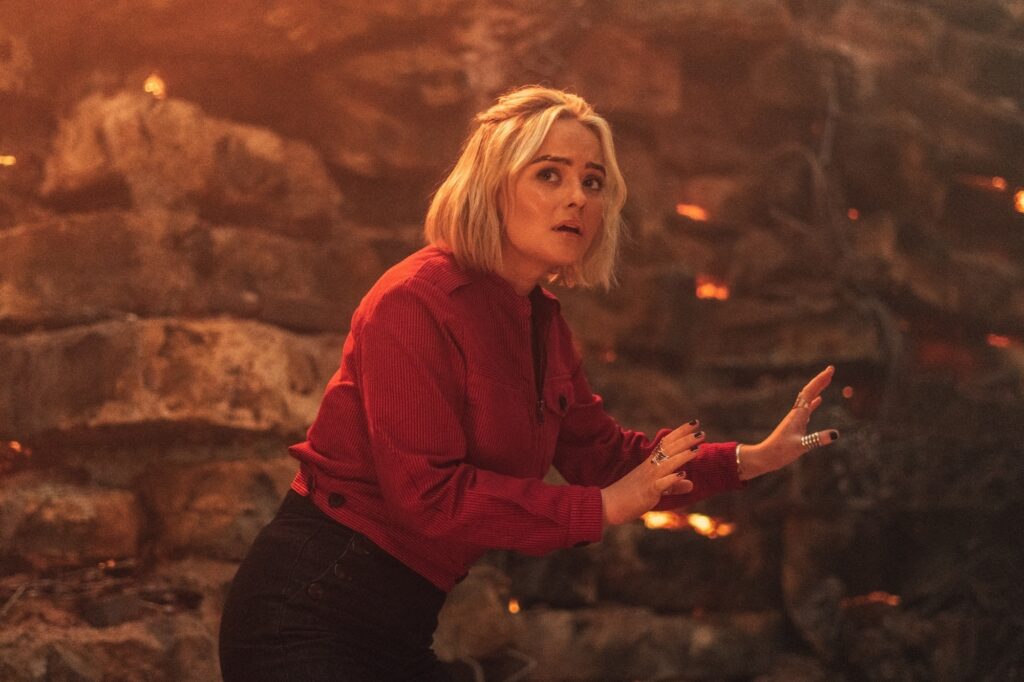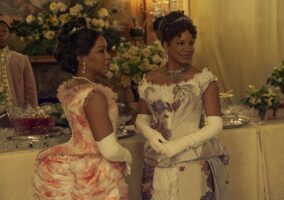
It seems showrunner Russell T. Davies isn’t the only old Doctor Who hand who came back this season with a newly revitalized take on the character. Steven Moffat, who shepherded the series as showrunner through the Matt Smith and Peter Capaldi years, came back to write this one and he managed to remind us of how good he can be when he’s firing on all cylinders. In fact, given the uneven-ness of the first two episodes of the season, it’s perhaps not the most encouraging revelation that so far, the best episode of Davies’ second run was written by his successor. To be fair, Moffat also wrote some of the best episodes of Davies’ first run. It also might not be the best sign that the best episode of the new regime is one that isn’t particularly concerned with whimsy or magic, but instead leans in hard on the classic Who story of a problem that needs to be solved while the clock ticks. True, there was that magic snowfall and we did get a sort of musical number, but for the most part, this was so such a classic tale of the post-2005 Doctor that it almost seems like a pastiche of earlier seasons. If anyone else had been responsible for this episode, we’d have called it an homage to the Davies/Moffat years. To be fair, a less charitable reading would see it as Moffat deploying a bunch of overused cliches that feel stale in this new era.
We never thought we’d be in the position of unpacking the legacy of Steven Moffat during this season, having exhaustively done so through several seasons’ worth of recaps, but he came right out of the gate with references calling back to his own tenure, from the return of the Anglican Marines, one of his more biting creations, (who appeared all throughout his run, with their most memorable appearance being in the Weeping Angels two-parter “The Time of the Angels” and “Flesh and Stone,” as well as the River Song shoe drop “A Good Man Goes to War”) to a story hinging on the idea of a person’s soul living on in digital form after death (a la “Silence in the Library” and “Forest of the Dead”), to little touches like “fish fingers and custard” and full-on deep-cut Easter Eggs like the antagonist Villengard. The Doctor mentioned blowing up their weapons factories all the way back in the previous season one’s “The Doctor Dances,” which was written by Moffat. And speaking of our dancing Doctor…

While his rendition of “Skye Boat Song” wasn’t technically a musical number in the conventional sense, this was about Moffat having fun playing with a version of the Doctor who sings on the regular. Nine and Ten would not have sung their way through a situation, even if their lives depended on it. It also struck us as the kind of double-edged wordplay or reference-making he tends to love. First, it serves as a sly callout to Outlander, which uses the song for its title sequence and which is based on a series of books by Diana Gabaldon, who took her inspiration for the time-traveling romance from…Doctor Who. Or you can see it as a callback to the Second Doctor, who was known to play it on his recorder. Knowing Moffatt, it’s likely a reference to both. But enough of all this nerd stuff. It was surprisingly fun to see Moffat playing in the sandbox again, but references weren’t what made the episode so great for us.
For one, Ncuti Gatwa and Millie Gibson fully settled into their roles and developed their rapport in this one. To be fair, Gatwa was great from his first scene, but there’s far less of a sense of him feeling the need to prove his bona fides, which is something every new Doctor actor goes through for their first few. In previous installments, we felt like Gibson needed to dial it back a little on the gulping and gawping, which she has done by now. Sure, she was still doing the wide-eyed fish-mouth thing, but the story gave her good reason. This felt like her first real test of fire as a Companion and we enjoyed her defiance and her bravery. Again, this is sort of like checking things off a list for these two. It was time for her to go from the gawping Companion to the capable one and it was time for the two of them to demonstrate what makes their pairing unique. The scene where she insisted on handing that gruesome counterweight was both a great character beat for both of them and a legitimately tense scene. Gibson and Gatwa played this moment beautifully. It was also genuinely heartbreaking when she begged the AI to tell her who her next of kin was while she lay dying. We feel like we have a handle on them by now. She clearly adores him, but she also clearly has no romantic feelings for him, nor does she come off dangerously infatuated with him. Her entire social circle seems to be queer people and she just snagged herself the most fabulous one of all. Which brings us to our next point.
Moffat was surprisingly great at really getting Fifteen’s voice and gave him some incredibly incisive, occasionally downright sassy lines. “I’m a lot more explosive than I look and honey, I know how I look.” Absolutely no previous Doctor actor could have gotten away with that line and Gatwa made an absolute meal out of it. It’s also somewhat notable how much of a bite Gatwa had this time around. Moffat always wrote his Doctors with an undercurrent of rage. We’re not entirely sure if this is the right take on this Doctor, who is supposed to be fully healed from all of his past trauma, but then again, he had a whole bunch of good reasons to be pissed off and no reasons to be nice about it. “Since when was the Church an army?” “Since most of your history. You’ve been living in a blip.” Which brings us to our next next point.

The deadly, society-destroying danger of runaway AI and heartless algorithms and endless war and for-profit healthcare; the new Doctor Who is more overtly political and socially critical than it’s ever been. “Faith. The magic word that keeps you from having to think for yourself.” This approach felt more like Davies, who has a history of thumbing his nose at any culture warriors than Moffat, who has a history of disavowing socially aware readings of his work. Davies has been quite gleefully open about how little he cares if people get mad about a Doctor Who that reflects a more modern approach.
What can we say? We can appreciate if anyone watched this episode and felt like it was a retread of a bunch of much better episodes, but for us, it was refreshing to get the Doctor and his Companion back to a relatively simple, straightforward adventure that allows them to be both brave and clever while saving the lives of genuinely interesting characters, except for the ones they fail to save, of course. Several things to note: The actress Susan Twist made another appearance, as the ambulance AI interface, making this her fifth appearance this season as a different character. Remember: “There’s always a twist at the end.” It’s also worth noting that much of the drama of this episode hinged on The Doctor continually referring to himself as a dad, which he has almost never done in his six-decade history. With the brief focus on his granddaughter Susan, the theme of children being separated from their birth parents, and now his sudden ease with revealing his own fatherhood, we can’t wait to see where this goes.
Anya Taylor-Joy in Dior at the FURIOSA: A MAD MAX SAGA Cannes After Party: IN or OUT? Next Post:
RUPAUL’S DRAG RACE ALL STARS: Drag Queens Save the World | The Paint Ball
Please review our Community Guidelines before posting a comment. Thank you!



